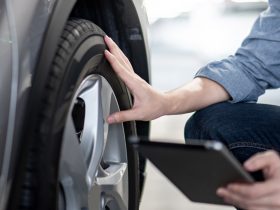Taking good care of your car and running regular maintenance and repair is going to extend its longevity and save you a lot of cash later on. Don’t expect your vehicle to magically solve its repair issues on its own; neither is it going to keep going efficiently while you keep ignoring significant warnings that something is going wrong. The moment you buy a car it becomes your responsibility to take care of it. Read through our quick guide to learn how to take proper care of your car.
Keep It Clean
As a first step, you have to get into the habit of cleaning your car regularly, especially the windshield. Driving with a dirty one is going to affect your vision while driving. So, in addition to being more aesthetically pleasing, it is also safer to drive a properly cleaned car. Hosing the undercarriage and fender wells from road dirt regularly helps protect your vehicle from hazards and limits repair issues.
Tire Pressure
One of the fundamentals of road safety is the condition of your tires. This should be taken seriously since tire pressure is meant to keep your vehicle balanced while driving. Over or underinflated tires should be addressed immediately to prevent blowouts on the road. Tires should always carry the correct air pressure not only for safety reasons but also because it extends their life span and improves fuel consumption.
Paint Protection
Your car is one of your valuable properties that needs maintenance and protection to work efficiently and remain in good shape. Your vehicle is subject to road dirt and debris, so using permanent protection such as Detail PHX & Ceramic Coating reduces paint damage caused by superficial impacts. It helps your car maintain a newer look, increases its luster, and prevents color fading. Some people wax their cars every couple of months to maintain their shine, but applying a paint protection coating will give you peace of mind for as long as you keep it.
Oil Check
Checking the oil levels is essential to maintaining your vehicle’s performance. Motor oil is responsible for all engine parts lubrication and damage prevention. The moving parts of the engine can easily break and cause dysfunction if the oil level drops. Engine oil is essential to eliminating heat and other harmful byproducts of the combustion cycle. It is also important to replace oil filters since all the damaging stuff is sent there.
Maintenance and repair are important to ensure your vehicle’s performance and efficiency. Major issues like oil and engine check-up, tires pressure, and paint protection sustain your vehicle’s longevity. Although contemporary cars are far more sustainable than older models, applying maintenance is still a crucial matter. Some maintenance issues like keeping the correct air pressure in your tires don’t have anything to do with the car model. Following service schedules and manuals can help prevent car damage caused by road hazards. Regularly washing your car removes dirt, debris, and road salt from accumulating. Waxing and paint protection coats reduce superficial damage and color fading and keep your car looking shiny and new.







